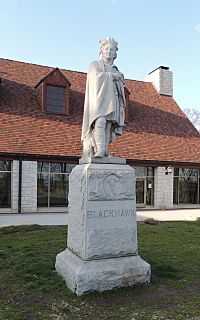John Hauberg Museum of Native American Life facts for kids

Statue of Black Hawk outside the museum
|
|
| Established | 1939 |
|---|---|
| Location | Rock Island, Illinois |
| Type | Native American |
| Public transit access | |
The John Hauberg Museum of Native American Life is a special place in Rock Island, Illinois, United States. It is located inside the Black Hawk Museum and Lodge at the Black Hawk State Historic Site. This museum teaches visitors all about the history and culture of the Sauk and Meskwaki Native American tribes.
Contents
Discovering the Museum's History
The museum is in a historic building that became famous in 1985. It is part of a group of important buildings called the Illinois State Park Lodges and Cabins Thematic Resources.
How the Park and Lodge Began
The area around the museum became a park in 1927. The main building, known as the lodge, was built a few years later in 1934. This building project was part of a program called the Civilian Conservation Corps. This program helped many people find work during a difficult time in history.
The Museum's Opening
The museum itself opened inside the lodge in 1939. Its collection started with items gathered by Dr. John Hauberg. He was a kind person from Rock Island who loved to help his community.
Learning About Native American Life
The museum shares the amazing story of the Sauk and Meskwaki tribes. These tribes once lived in a large village nearby called Saukenuk. It was one of the biggest Native American villages in North America at the time.
What You Can See Inside
The museum has many interesting exhibits. You can see models of the winter and summer homes these tribes used. There are also special displays called dioramas. These dioramas show what daily life was like for the people who lived there between 1750 and 1830.
Special Items on Display
The collection includes real items that the tribes used. You can see trade goods, which are items they traded with others. There is also beautiful jewelry and everyday household items. These artifacts help us understand how the Sauk and Meskwaki people lived long ago.
 | Lonnie Johnson |
 | Granville Woods |
 | Lewis Howard Latimer |
 | James West |

